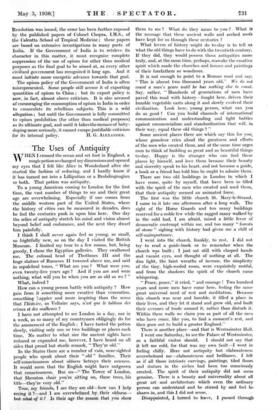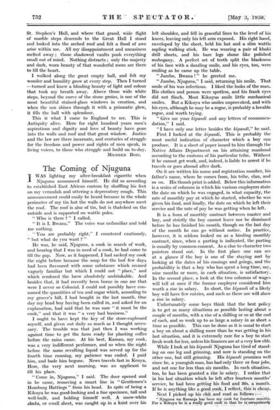The Uses of Antiquity
wurusr I crossed the ocean and set foot in England, a magic potion so changed my dimensions and opened my eyes that I felt like Alice in Wonderland after she started the fashion of reducing, and I hardly know if it has turned me into a Lilliputian or a Brobdingnagian or both. That potion was antiquity.
To a young American coming to London for the first time, the vast number of things to see and their, great age are overwhelming. Especially if one comes from the middle western part of the United, States, where the history of cities can be measured in decades, does he feel the centuries push in upon him here. One day the relics of antiquity stretch his mind and vision almost beyond belief and endurance, and the next they dwarf him painfully.
I think I shall never again feel so young, so small, so frightfully new, as on the day I visited the British Museum. I limited my tour to a few rooms, but, being greedy, I chose the Egyptian galleries. They swallowed me. The colossal head of Thothmes III and the huge statues of Ramses II towered above me, and said in sepulchral tones, "What are you ? What were you, even twenty-five years ago ? And if you are and were nothing, what will you be when you are as old as we ? "
What, indeed ?
How can a young person battle with antiquity ? How gain from it something more creative than veneration, something Lappier and more inspiring than the sense that l'histare, as Voltaire says, n'est que is tableau des crimes et des malheurs?
I have not attempted to see London in a day, nor in a week, as so many of my countrymen obligingly do for the amusement of the English ; I have tasted the potion slowly, visiting only one or two buildings or places each time. No matter to what size the ancient sights have reduced or expanded me, however, I have heard on all sides that proud but sterile remark, "They're old."
In the States there are a number of vain, near-sighted people who speak about their " old " families. Their self-consciousness about oldness betrays their newness. It would seem that the English might have outgrown that consciousness. But no—" The Tower of London, that Sheraton chair you're_ sitting on, these trees, his title—they're very old." .
True, my friends, I see they are old—how can I help seeing it ?—and I am oyerwhelmed by their oldness— but what.Eof it ? Is their age the -ason that you show them to me ? What do. they mean to you. ? 'What it the message that these ancient walls and arched roofs have kept for us through these centuries ?
What lovers of history might do to-day is to tell us what the old thingslave to do with the twentieth century. If they did, they : would possess those antiquities more truly, and, at the same time, perhaps, reawake the creative spirit which made the churches and houses and paintings of their forefathers so wondrous-.
It is not enough to point to a Roman road and say; "This is almost two thousand years old." We do uot count a man's years. until he has nothing else to count. Say, rather, "Hundreds of generations of men have paved this road with history—fought here, driven their humble. vegetable, carts along it and slowly evolved their civilization. Look here, young person, what can you do as good ? Can you build channels of international communication and understanding and light battles against commercialism and standardization that will, in their way., equal these old things ? " . .
• Some ancient places there are which say 'this- for you, whose grandeur cries aloud the greatness and efforts of the men who created _them, and at the same time urges men to think of building as great and as beautiful things to-day. Happy is the stranger who can find these places by himself, and love them because their, beauty and sincerity speak to his heart, and not because a guide, a book-or a friend has told- him he ought to admire them: There are two old buildings in London to which I have come, quite by myself, that have been so filled with the spirit of the men who created and used them, that their antiquity seemed an animated force.
The fist was the little church St. Mary-le-Strand. I came to it late one afternoon. after a long walk. The sight of the Horse_ Guards and too many buildings reserved for a noble few while the ragged many walked -by in the --cold had, I am afraid, raised a little -fever Of democratic contempt within me, and too many "forests of stone" sighing with history had given me a chill of self-unimportance.
I went into the church, frankly, to rest. I did not try to read a guide-book or to remember when the church was . built ; I just sat still with clasped hands and vacant eyes, and thought of nothing at all. The dim light, the faint wreaths of incense, the simplicity of the tiny, high-roofed room, were exquisitely restful, and from the shadows the spirit of the church came whispering.
"Peace, peace," it cried, "and courage ! Two hundred years and more, men have come here, ' feeling the same great universal need of rest and meditation. Because this church was near and humble, it filled a place in their lives, and they let it stand and grow old, and built their avenues of trade around it, rather than disturb it. Within these walls we claim you as part of all the men who have come, like you, to find a moment's rest, and then gone out to build a greater England."
There is another place—and that is Westminster Hall.
I went one Saturday, to see the Palace of Westminster, as a faithful visitor should. I should not say that it left me cold, for that was my own fault—I went in feeling chilly. Here not antiquity but • elaborateness overwhelmed me—elaborateness and -brilliance:. I felt as if all those intricate carvings, paintings, tiled floors and statues in the niches had been too consciously created. The spirit of their antiquity did not seem genuine.- . There is a beauty and universality about all great art and architecture which even the ordinary person- can understand and be stirred by and feel he shares in, and this .I. did not sense. • • Disappointed, I turned to leave. I passed through St. Stephen's Hall, and where that grand, wide flight of marble steps descends to the Great Hall I stood and looked into the arched roof and felt a flood of awe arise within me. All my disappointment and uneasiness melted away ; those shadowed vaults push everything small out of mind. Nothing distracts ; only the majesty and dark, worn beauty of that wonderful room are there to fill the heart.
I walked along the great empty hall, and felt my wonder and humility grow at every step. Then I turned —turned and knew a blinding beauty of light and colour that took my breath away. Above those wide white steps, beyond the curve of the stone groins, is one of the most beautiful stained-glass windows in creation, and when the sun shines through it with a prismatic glow, it fills the hall with splendour.
This is what I came to England to see. This is Antiquity alive. Here for eight hundred years men's aspirations and dignity and love of beauty have gone into the walls and roof and that great window. Justice and the law are there incarnate, and centuries of struggle for the freedom and power and rights of men speak, in living voices, to those who struggle and build on to-day.
MILDRED BOIE.















































 Previous page
Previous page